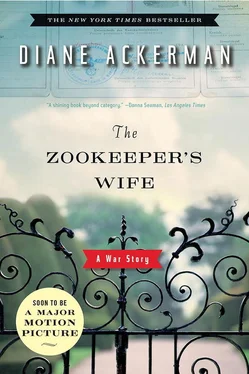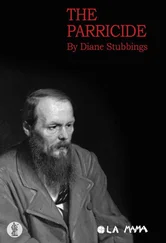“Maybe it’s good news,” Antonina told herself, “maybe it’s peace at last and the chance to rebuild.”
After a rainy morning, thick cloud banks shifted and a warm October sunlight began streaming through as German soldiers patrolled each neighborhood, filling the streets with the clop of heavy bootheels and gabble in a foreign tongue. Then different sounds filtered into the lampshade store, more sibilant and transparent: crowd voices of Polish men and women. Antonina saw “one large organism flowing slowly” downtown and people trickling out of buildings to join it.
“Where do you suppose they’re heading?”
The radio told them where Hitler was preparing to review his troops, and she and Jan felt the same osmotic force tugging them outside. Everywhere Antonina looked lay destruction. In her jottings, she described “buildings guillotined by the war—their roofs gone, sitting in misshapen poses somewhere in nearby backyards. Other buildings looked sad, ripped up by bombs from top to basement.” They reminded her of “people embarrassed by their wounds, looking for a way to cover the openings in their abdomens.”
Next Antonina and Jan passed rain-soaked buildings missing their plaster, with exposed blood-red bricks steaming in the warm sunshine. Fires still burned, the entrails of homes still smoldered, filling the air with enough smoke to make eyes tear and throats tighten. Hypnotized, the swelling crowd flowed to the center of the city, and in archival films one can see them lining the main streets, down which conquering German soldiers march in a steady torrent of gunmetal-gray uniforms, their steps echoing like ropes walloping hardwood.
Jan turned to Antonina, who looked faint.
“I can’t breathe,” she said. “I feel like I’m drowning in a gray sea, like they’re flooding the whole city, washing away our past and people, dashing everything from the face of the earth.”
Jammed inside the crowd, they watched gleaming tanks and guns stream by, and ruddy-faced soldiers, some with stares Jan found so provocative that he had to turn away. Puppet theater, a popular art form in Poland, wasn’t just for children but often grappled with satiric and political subjects, as it had in ancient Rome. Old films show what locals may have found ironic: a loud brass band heralding waves of glossy cavalry and strutting battalions, and Hitler reigning on a platform farther down the avenue, reviewing the troops with one hand held aloft like a puppeteer twitching invisible strings.
Delegates from Poland’s main political parties were already meeting in the strong room of a savings bank to refine the Underground, which nearly began with success: explosives planted beneath Hitler’s platform were supposed to blow him to crumbs, but at the last minute a German official moved the bomber to another spot and he couldn’t light the fuse.
The city quickly spasmed into German hands, banks closed, salaries dried up. Antonina and Jan moved back to the villa, but stripped of money and supplies, they scavenged for food left by the Polish soldiers who had billeted there. The new German colony was ruled by Hitler’s personal lawyer, Hans Frank, an early member of the Nazi Party and a leading jurist busy revising German laws according to Nazi philosophy, especially racist laws and those aimed at the Resistance. During his first month in office, Governor-General Frank declared that “any Jews leaving the district to which they have been confined” would be killed, as would “people who deliberately offer a hiding place to such Jews…. Instigators and helpers are subject to the same punishment as perpetrators; an attempted act will be punished in the same way as a completed act.”
Soon afterward, he issued the “Decree for the Combating of Violent Acts,” which imposed death on anyone disobeying German authority, mounting acts of sabotage or arson, owning a gun or other weapons, attacking a German, violating curfew, owning a radio, trading on the black market, having Underground leaflets in the home—or failing to report scofflaws who did. Breaking laws or failing to report lawbreakers, both acting or observing, were equally punishable offenses. Human nature being what it is, most people didn’t wish to get involved, so few people were denounced, and fewer still denounced for not denouncing others… in what could quickly have become an absurdist chain of disinclination and inaction. Somewhere between doing and not doing, everyone’s conscience finds its own level; most Poles didn’t risk their lives for fugitives but didn’t denounce them either.
Hitler authorized Frank to “ruthlessly exploit this region as a war zone and booty country, and reduce to a heap of rubble its economic, social, cultural, and political structure.” [11] Proceedings of the Trial of the Major War Criminals Before the International Military Tribunal, Nuremberg, vol. 290, ND 2233-PS; quoted in Anthony Read, The Devil’s Disciplines: Hitler’s Inner Circle (New York: W. W. Norton, 2004), p. 3.
One of Frank’s key tasks was to kill all people of influence, such as teachers, priests, landowners, politicians, lawyers, and artists. Then he began rearranging huge masses of the population: over a span of five years, 860,000 Poles would be uprooted and resettled; 75,000 Germans would take over their lands; 1,300,000 Poles would be shipped to Germany as slave labor; and 330,000 would simply be shot. [12] Adam Zamoyski, The Polish War: A Thousand Year History of the Poles and Their Culture (New York: Hippocrene Books, 1994), p. 358.
With courage and ingenuity, the Polish Resistance would sabotage German equipment, derail trains, blow up bridges, print over 1,100 periodicals, make radio broadcasts, teach in covert high schools and colleges (attended by 100,000 students), aid Jews in hiding, supply arms, make bombs, assassinate Gestapo agents, rescue prisoners, stage secret plays, publish books, lead feats of civil resistance, hold its own law courts, and run couriers to and from the London-based government-in-exile. Its military wing, the Home Army, at its height included 380,000 soldiers—among them, Jan Żabiński, who later told interviewers, “from the very beginning, I was connected to the Home Army in the area of the zoo.” [13] Jan Żabiński quoted in a Yiddish newspaper, in Israel, on the occasion of the Żabińskis being honored by Yad Vashem as “Righteous Among Nations.” Newspaper article provided by Ryszard Żabiński.
Confusing as life during occupation must have been, the clandestine Polish state, linked by language rather than territory, would fight nonstop for six years.
A key to the Underground’s strength was its no-contact-upward policy and the unflagging use of pseudonyms and cryptonyms. If no one knew his superior, capture wouldn’t endanger the core; and if no one knew anyone’s real name, saboteurs proved hard to find. Underground headquarters floated around the city, and schools migrated from one church or apartment to another, while a band of couriers and illegal printshops kept everyone informed. The Underground Peasant Movement adopted the slogan of “As little, as late, and as bad as possible,” and set about sabotaging deliveries to Germans and diverting supplies to people in the cities, repeatedly claiming delivery of the same grain or livestock, overstating receipts, conveniently losing, destroying, or hiding provisions. Forced laborers in the secret German rocket program at Peenemünde urinated on the electronics to corrode them, crippling the rockets. The Resistance encompassed so many cells that anyone could find a niche, regardless of age, education, or nerve. Jan had a penchant for risk, which he later told a reporter he found exciting, adding in his understated way that its pulse-revving gamble felt rather “like playing chess—either I win or I lose.”
Читать дальше












